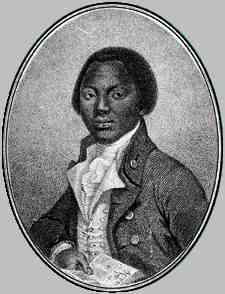
LITR 4332 American Minority
Literature
Literary-Style Presentation 2008
|
Tuesday, 2 September: begin Classic Slave Narratives: Literary-Style Reader (Classic Slave Narratives): Leigh Ann Moore |
|
The Interesting Narrative of the Life of Olaudah Equinao, or Gustavus Vassa, the African
Objective 5 Reconnecting to a past not voluntarily abandoned
Shattering of traditional family connections
Objective 6 b literary devices (narrative)
c express the minority voice and vicariously share the minority experience
First impressions
- Autobiographical first person I
Uses first person to draw reader in to feeling of imminent danger and constant trauma
Story of identity African/Slave
Olaudah/Jacob/Gustavus
- Narrative travel tale amount of travel and variety of slave owners
Effectively targets audience, predominantly white, by speaking of loyalty to whites who treated him well. Also, he uses passages to speak directly to the reader to challenge the reader about the morality of slavery.
Story of survival
Identity - Naming
[ch. 3, par. 4] While he was fast asleep I indulged myself a great deal in looking about the room, which to me appeared very fine and curious. The first object that engaged my attention was a watch which hung on the chimney, and was going. I was quite surprised at the noise it made and was afraid it would tell the gentleman anything I might do amiss: and when I immediately after observed a picture hanging in the room, which appeared constantly to look at me, I was still more affrighted, having never seen such things as these before. At one time I thought it was something relative to magic; and not seeing it move I thought it might be some way the whites had to keep their great men when they died, and offer them libation as we used to do to our friendly spirits. In this state of anxiety I remained till my master awoke, when I was dismissed out of the room, to my no small satisfaction and relief; for I thought that these people were all made up of wonders. In this place I was called Jacob; but on board the African snow I was called Michael.
..
[ch. 3, par. 7] I was still at a loss to conjecture my destiny. By this time, however, I could smatter a little imperfect English; and I wanted to know as well as I could where we were going. Some of the people of the ship used to tell me they were going to carry me back to my own country, and this made me very happy. I was quite rejoiced at the sound of going back; and thought if I should get home what wonders I should have to tell. But I was reserved for another fate, and was soon undeceived when we came within sight of the English coast. While I was on board this ship, my captain and master named me Gustavus Vassa. I at that time began to understand him a little, and refused to be called so, and told him as well as I could that I would be called Jacob; but he said I should not, and still called me Gustavus; and when I refused to answer to my new name, which at first I did, it gained me many a cuff; so at length I submitted, and was obliged to bear the present name, by which I have been known ever since.
Addressing Audience
[ch. 2, par. 29] In this manner, without scruple, are relations and friends separated, most of them never to see each other again. I remember in the vessel in which I was brought over, in the men's apartment, there were several brothers, who, in the sale, were sold in different lots; and it was very moving on this occasion to see and hear their cries at parting. O, ye nominal Christians! might not an African ask you, learned you this from your God, who says unto you, Do unto all men as you would men should do unto you? Is it not enough that we are torn from our country and friends to toil for your luxury and lust of gain? Must every tender feeling be likewise sacrificed to your avarice? Are the dearest friends and relations, now rendered more dear by their separation from their kindred, still to be parted from each other, and thus prevented from cheering the gloom of slavery with the small comfort of being together and mingling their sufferings and sorrows? Why are parents to lose their children, brothers their sisters, or husbands their wives? Surely this is a new refinement in cruelty, which, while it has no advantage to atone for it, thus aggravates distress, and adds fresh horrors even to the wretchedness of slavery.
Questions:
1. Do you feel the idea of naming in the first selections is significant in this narrative?
2. Do you feel that the author addressed his main audience well?
3. Were there any other passages or literary devices that stood out?
